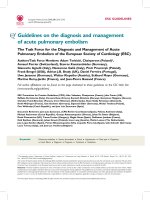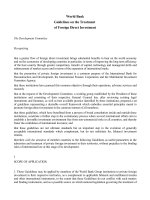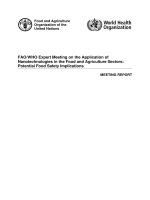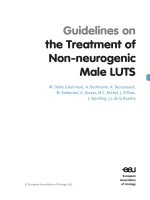WHO Annex 6 Guidelines on the requalification of prequalifi ed dossiers TRS957 Annex6 Requalification
Bạn đang xem bản rút gọn của tài liệu. Xem và tải ngay bản đầy đủ của tài liệu tại đây (65.76 KB, 6 trang )
© World Health Organization
WHO Technical Report Series, No. 957, 2010
Annex 6
Guidelines on the requalification
of prequalified dossiers
1.
Introduction
2.
Requalification of prequalified dossiers
Appendix 1
Summary of key product information
Appendix 2
Variations to the product
1.
Introduction
In accordance with the provisions set out in section 12 (Maintenance
of prequalification status) of the Procedure for prequalification of
pharmaceutical products1, holders of WHO-prequalified products should
submit a quality review 5 years from the date of prequalification of the
product, or when requested to do so by WHO Prequalification (whichever
date is earlier).
3
Section 12 of the above-mentioned guidelines states that:
WHO will furthermore arrange for the products and manufacturing
sites included in the list to be re-evaluated at regular intervals. If, as a
result of this re-evaluation, it is found that a product and/or specified
manufacturing site no longer complies with the WHO-recommended
standards, such products and manufacturing sites will be removed
from the list. Failure of a manufacturer or applicant to participate in
the re-evaluation procedure will also lead to removal from the list.
Re-evaluation, including re-inspections of manufacturing sites and
contract research organizations (CROs), will be done at regular
intervals, based on risk assessment, but at least once every 5 years.
Re-evaluation, including re-inspections, shall also be performed:
1
Procedure for prequalification of pharmaceutical products. In: WHO Expert Committee on
Specifications for Pharmaceutical Preparations. Forty-third report. Geneva, World Health
Organization, 2009, Annex 4 (WHO Technical Report Series, No. 953) ( />medicines/publications/pharmprep/pdf_trs953.pdf#page=145).
265
• if any fraud or omissions by the applicant, manufacturer(s) of a
finished pharmaceutical product (FPP) or active pharmaceutical
ingredient (API), or CROs in the initial assessment procedure or
during the follow-up activities, becomes evident; and
• if WHO or any United Nations agency considers that a batch or
batches of supplied prequalified pharmaceutical products are not
in compliance with the specifications which were found to be
applicable upon prequalification.
Requalification will be applicable to multisource FPPs (generics) where
the full dossiers have been submitted, assessed and prequalified by WHO.
Renewal of marketing authorization for products that have been listed by
WHO based on approval by a stringent regulatory agency2 (SRA) remains
the responsibility of the relevant SRA.
4
Requalification of prequalified dossiers
2.
The objective of this quality review submission is to enable WHO to
requalify the product based on an assessment of the data and information
submitted by the holder of a prequalified product, which includes verification
of the acceptability of the product and its conformity to current norms and
standards, and assessment of consistency of the quality of the prequalified
FPPs, and its manufacturing process(es) over the identified period.
The holder of a prequalified product should submit the following documents
electronically (in pdf format and in also in WinWord where indicated):
• A covering letter, which should contain a clear statement by the responsible
person submitting the quality review, indicating that the information
submitted is true and correct.
• Summary of key product information (as per Appendix 1).
• Variations to the product (as per Appendix 2).
• A pharmaceutical quality information form (PQIF)3, completed
in WinWord format. It should reflect the requirements of current
prequalification guidelines and should also take into account technical and
5
2
3
Stringent regulatory authority (SRA): a regulatory authority which is:
a member of the International Conference on Harmonisation (ICH) (as specified on www.ich.org);
or
an ICH observer, being the European Free Trade Association (EFTA), as represented by Swiss
Medic, Health Canada and World Health Organization (WHO) (as may be updated from time to
time); or
a regulatory authority associated with an ICH member through a legally-binding, mutual
recognition agreement including Australia, Iceland, Liechtenstein and Norway (as may be
updated from time to time).
Presentation of pharmaceutical quality information. In: Guidance for submission of documentation
for prequalification of multi-source (generic) finished pharmaceutical products (FPPs) used in
the treatment of HIV/AIDS, malaria and tuberculosis. Annex 8 ( />applicants/Guidelines/GuideGenericSubmitDocFPPs_08_2005_ANNEX8.doc).
266
scientific progress. The API and FPP specifications should be provided in
tabulated format, comparing the specifications at prequalification and at
the time of the requalification submission.
• Copies of the current API and FPP specifications, duly signed and
dated, including the test methods. The specifications should indicate the
reference number, version number, effective date and change history if
any.
A product quality review may be submitted as supportive documentation. It
may also be requested by WHO.
267
Appendix 1
Summary of key product information
This section compares key information on the FPP at the time of
prequalification and at the time of the submission for requalification. Table
A1.1 should be completed by the holder of the prequalified product. Include
remarks as a footnote to Table A1.1, where deemed necessary, to clarify the
information provided.
Table A1.1
Summary of key product information
Item
Product number (e.g. HA001)
INN, strength and pharmaceutical
form
Applicant (name, physical address
and contact numbers)
Manufacturing site(s) of FPP, with
physical address (including unit and
block numbers) and contact numbers
(list separately if different steps are
performed by different sites, e.g.
packaging, quality control)
Batch size(s) of FPP
Product description
(visual appearance)
Primary and secondary packaging
material(s) and pack size(s)
Storage conditions of FPP
Shelf-life of FPP
FPP specification(s) reference number
and/or versionb
Manufacturer(s) of API(s), with
physical address (including unit and
block numbers) and contact numbers
(list each API separately)
Number/version of each APIMF
associated with the FPP
Storage conditions of API
Retest period of API(s)
API specification(s) reference number
and/or version (for each API)b
All commitments and their outcomes
268
Prequalified dossier
Current dataa
INN, international nonproprietary name; FPP, finished pharmaceutical product; API, active
pharmaceutical ingredient; APIMF, active pharmaceutical ingredient master file.
a
If there has been no update of the dossier then indicate “N/A” (not applicable).
b
According to the latest editions of The International Pharmacopoeia (Ph.Int.), the European
Pharmacopoeia (Ph.Eur), the British Pharmacopoeia (BP) and/or the United States Pharmacopeia
(USP). Where in-house specifications have been approved and there is now a monograph in any
of the internationally-recognized pharmacopoeias (Ph.Int., Ph.Eur, BP, or USP), the specifications
should be updated to comply with the new monograph or demonstrated to be at least equivalent. In
the case that no compendial monograph exists, the applicant should ensure that the approved inhouse specifications are updated, through the variation process, to reflect the requirements of current
prequalification guidelines and to take into account technical and scientific progress (e.g. current
ICH guidelines, general chapters of the Ph.Int.). Each new version of the documents should allow
traceability to the prequalified dossier and approved variations.
269
Appendix 2
Variations to the product
The holder of the prequalified product should submit a review, in tabular
format, of any minor and/or major changes (including those pending) to
the initially prequalified product or to the terms of the initially prequalified
dossier. Table A2.1 should be completed by the holder of the prequalified
product.
Table A2.1
Information on variations to the prequalified product
Reference no.
Date of
submission
Date of approval/
rejection and reference
number of the letter
Date of
implementation
Major changes
Description of the
change, e.g. change in
the primary packaging
site of a sterile product
Minor changes
Description of the
change according to the
PQ variation guide
Add as many rows as necessary.
Note. Requests for variations should have been submitted in accordance with WHO’s Guidance on
variations to a prequalified product dossier4.6
4
WHO Guidance on variations to a prequalified product dossier. In: WHO Expert Committee
on Specifications for Pharmaceutical Preparations. Forty-first report. Geneva, World Health
Organization, 2007, Annex 6 (WHO Technical Report Series, No. 943) ( />prequal/info_general/documents/TRS943/TRS943.pdf#page=121).
270









